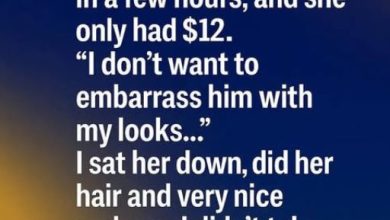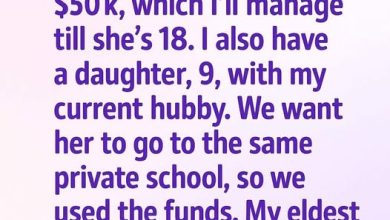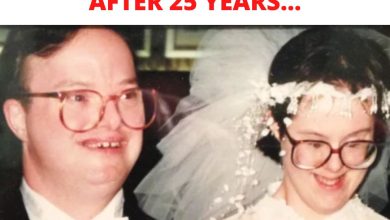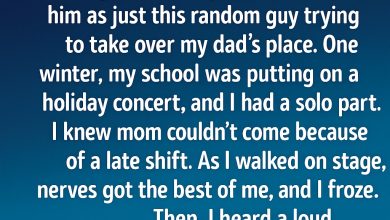After 50 Years Together, She Made a Life-Changing Decision, and Faced the Consequences
For fifty years, Rose and Charles Bennett had built a life that looked like devotion. They raised two children, weathered recessions and illnesses, and filled their Portland home with laughter, family photos, and the faint scent of Charles’s pipe tobacco. To anyone looking in, they were the picture of enduring love—steady, constant, unshakable.
But inside Rose, something had begun to shift.
At seventy-five, she stood before her mirror one morning and saw a stranger. Every choice—where to live, what to cook, how to spend weekends—had been shaped around someone else. She had been a wife, a mother, a caretaker. But who was she now?
“I feel like I’ve lived my whole life for everyone but me,” she confessed to her sister over tea. “And now that it’s almost over, I don’t even know who I am.”
Her sister squeezed her hand. “It’s never too late to find yourself.”
That sentence lit a spark. And the spark became a fire.
The Breaking Point
At first, Charles didn’t notice. Rose took longer walks, joined a book club downtown, changed her hairstyle. But soon, the distance between them grew. She became quiet, withdrawn, often staring out the window for hours. When he asked what was wrong, she’d only say, “Nothing, Charles. Nothing at all.”
But it was something. It was everything.
Arguments followed—small, then sharp. He thought she was restless. She thought he’d stopped seeing her.
“You don’t listen,” she said one night.
“I’ve been listening to you for fifty years,” he replied.
“No,” she said. “You’ve been hearing me. That’s not the same.”
The words hung in the air like smoke.
By autumn, Rose made a decision that stunned them both. She wanted a divorce.
Charles didn’t fight. He didn’t plead or rage. He simply nodded. “If that’s what will make you happy, Rose, I’ll let you go.”
She mistook his gentleness for indifference.
The Final Dinner
Two months later, they sat across from each other in their lawyer’s office, signing papers that ended half a century of shared life. When it was done, the lawyer—who had known them for years—suggested dinner at the restaurant where Charles had proposed fifty-one years ago.
Rose agreed out of politeness. Charles agreed because he still loved her.
The restaurant hadn’t changed. Red booths. Dim lighting. “Unforgettable” playing softly overhead.
Charles smiled. “Remember this song?”
Rose nodded but didn’t smile.
He ordered for both of them—just as he always had. “Small salad for you, grilled salmon for me. The lights here are bright—you still need to be careful with your eyes.”
Rose froze. Her chest tightened.
There it was again—that quiet control she’d mistaken for care. “You don’t get to decide for me anymore, Charles,” she said, voice trembling.
“Rose, I wasn’t—”
“I can order my own salad.”
She stood. The room went silent. She walked out, leaving him alone at the table.
The Letter
That night, Charles returned to their now-empty home and sat at his desk. The chair creaked under the weight of fifty years of love and regret. He pulled out a piece of stationery—the kind Rose used for birthday letters—and began to write.
My dearest Rose,
I don’t know how to fix what’s broken between us, but I know I would if I could.
I never meant to control you. I just wanted to care for you.
When I dim the lights, it’s because I remember how you squint when they’re too bright.
When I order your salad, it’s because I’ve watched you pick out the tomatoes every time for fifty years.
Maybe that’s my problem—I’ve loved you in the only way I know how: quietly, through actions instead of words.
If I ever made you feel trapped, I’m sorry. I only ever wanted to keep you safe.
Always,
Charles
He folded the letter, placed it on her nightstand, and lay down.
He never woke up.
The Heart Attack
The next morning, Rose got the call. Charles had suffered a massive heart attack. He was alive, but unconscious.
She drove to the hospital in silence, her mind racing with everything unsaid, everything she’d walked away from.
At home, gathering a few things, she saw the envelope on the nightstand. Her name—Rose—written in his shaky hand.
She opened it. By the time she finished reading, she was sobbing.
Every word cut through her like sunlight through fog. What she had mistaken for control had been love in its quietest form. Every dimmed light, every ordered meal, every jacket draped over her shoulders—it had all been care, not constraint.
He hadn’t been trying to own her. He’d been trying to protect her.
The Second Chance
At the hospital, she sat beside him, clutching his hand, whispering apologies into the sterile air.
“I was wrong, Charlie,” she said. “You weren’t holding me back. You were holding me up.”
When he opened his eyes hours later, she was still there.
“Rose,” he croaked, “you came back.”
“I never should have left,” she said. “If you’ll have me, I want to come home.”
He squeezed her hand. His eyes said everything.
Life After the Fall
In the months that followed, they moved slowly. They talked—really talked—for the first time in years. They started therapy. Took walks. Sat in silence without needing to fill it.
They renewed their vows under the oak tree they’d planted the year their first child was born.
“I used to think love was about feeling young,” Rose said. “But now I know it’s about growing old—and still choosing each other, even when it’s hard.”
Charles chuckled. “Especially when it’s hard.”
They lived not as husband and wife out of habit, but as partners out of choice. Each day felt like a gift they’d nearly lost.
The Lesson
Five years later, when Charles passed peacefully in his sleep, Rose sat on their porch with the letter folded in her pocket. She’d memorized every word.
She often told her grandchildren, “Love isn’t always grand gestures or fairy tales. Sometimes it’s turning down the lights for someone who forgot to notice the glare.”
Rose lived another decade. She visited the restaurant often. The staff knew her by name. She always ordered two salads—one for herself, one for him.
And every time, she smiled at the empty chair across from her and whispered, “Thank you for loving me in ways I didn’t understand.”
Because in the end, she had learned what many never do:
Love isn’t about freedom from someone.
It’s about finding freedom with them.




